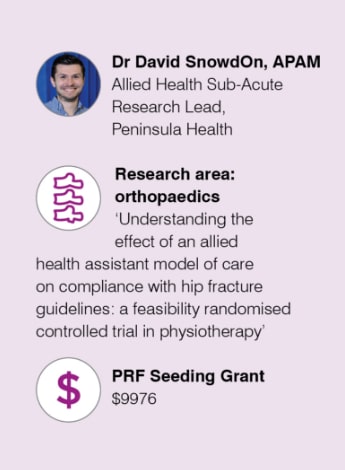
Looking at assistants to assist with hip fracture management

When conducting his PhD three years ago, Dr David Snowdon investigated the impact of elevating junior physiotherapists to improve patient outcomes after hip surgery. Here, the 2020 PRF Seeding Grant recipient discusses his research project.
Dr David Snowdon, the Allied Health Sub-Acute Research Lead at Peninsula Health, discovered that the collaborative approach of having senior clinicians monitor junior clinicians’ treatment of patients post-surgery improved mobilisation rates.
David is testing the study of supervision further with a feasibility trial of an allied health assistant model of care on compliance with hip fracture guidelines.
Guidelines state that patients with hip fracture should be mobilised on the day after surgery and at least once a day thereafter.
Health professionals consider hip fractures the most serious and costly fall-related injury suffered by older people.
The Australian and New Zealand Hip Fracture Registry reports more than 25,000 people break their hip each year, with the cost to the economy about $1 billion annually.
‘As life expectancy increases and the population ages, the number of people admitted to hospital with a hip fracture will continue to rise, placing an even greater burden on physiotherapists who are instrumental in ensuring patients are mobilised to maintain independence with functional tasks,’ David says.
'Training allied health assistants to assist with mobilisation has the potential to improve outcomes while maintaining the efficiency and reach of physiotherapy services in the public healthcare system.
‘One thing we know about hip fracture management is that the treatment itself is very much informed by guidelines. We know that we have to mobilise patients each day after surgery.
'Because allied health assistants focus on providing therapy and do not play a role in assessment or prescribing patient care, they may have greater capacity to increase the frequency of mobilisation of patients.

'The theory is that it might even be more effective because they have more time to spend with the patients.’
The trial, titled ‘Understanding the effect of an allied health assistant model of care on compliance with hip fracture guidelines: a feasibility randomised controlled trial in physiotherapy’, is a standalone study and part of a series of projects.
The projects examine the effect of delegating patient-related tasks, such as therapy, to allied health assistants.
It is funded from a Physiotherapy Research Foundation (PRF) Seeding Grant. The PRF has awarded more than $1.6 million in research grants since 1990 and last year, six seeding grants were awarded, with David receiving $9976.
‘It’s challenging to run projects, and to come up with ideas and get them off the ground. We wouldn’t have the resources to run this project if it wasn’t for the Seeding Grant.
'Running research in hospitals can be tricky, because hospitals are there to help people not to conduct research. Without the PRF, some research would just not happen.’
The 12-month trial was to start last year, but paused because of COVID-19. It got underway in February and David’s multidisciplinary team is hoping to recruit 50 people.
‘Obviously, that’s going to be dependent on people coming through the doors… to delay has been very frustrating for the team because we put a lot of effort into training the allied health assistants to be able to perform the treatment.
'But, if we did start we would have had to stop, so it’s probably been a good thing because we’ve now got a system in place in which we can be COVID safe, and even if we were to have another lockdown we would be able to continue the trial.’
Feasibility will be determined using the Bowen framework and will include assessment of acceptability, demand, implementation and practicality.
‘It’s exciting to see if we can extend the scope of practice of allied health assistants. Delegating and supervising mobilisation of patients with hip fracture could help physiotherapists be more efficient in the hospital system and, most importantly, ensure patient outcomes improve.’
>> Thanks to member donations, the PRF can support researchers such as David Snowdon. Click here to find out more.
© Copyright 2025 by Australian Physiotherapy Association. All rights reserved.





